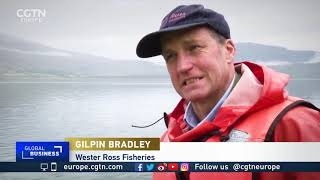Scottish salmon is taking off in a huge way. Both literally and metaphorically.
02:03

Literally, because it is now hitting Chinese shelves just 36 hours after it's plucked from the water, thanks to faster freight methods, ensuring Chinese consumers are getting the freshest possible product.
And metaphorically because it seems China can't get enough of it.
"We can harvest salmon from this site from a Friday and it will be in China on a Sunday afternoon," explains Gilpin Bradley, owner of Wester Ross Salmon Farm located in the picturesque Ullapool in the Scottish Highlands.
"The demand for all farmed salmon – and in particular, Scottish salmon – is far outstripping supply. And the Chinese are a very demanding client base. They want only the best and the freshest," he adds.

The salmon farms are often located in the picturesque Scottish Highlands. (Credit: CGTN)
The salmon farms are often located in the picturesque Scottish Highlands. (Credit: CGTN)
This remote site is Scotland's last remaining independent salmon farm. All the others have been bought by large conglomerates from overseas. There is no way this place will be selling up soon: "Salmon farming is the greatest economic success story in the Highlands," says Bradley. "It's that important. It's private enterprise, there's no subsidy attached to it."

Gilpin Bradley recognizes the importance of providing fresh salmon to the Chinese market. (Credit: CGTN)
Gilpin Bradley recognizes the importance of providing fresh salmon to the Chinese market. (Credit: CGTN)
Scotland's salmon export market is worth around $1.3 billion a year now. And it is a sector that is only expected to grow. That is partly due to China, because the middle class is growing and, therefore, so is the demand for luxury goods. Scotland provides two of these – salmon and whisky.
But the big shadow looming over many British businesses still prevails – with economic uncertainty over what will or won't happen if or when the UK does exit the European Union, surely Brexit is a big worry?

The Wester Ross Salmon Farm is at the forefront of Scotland's salmon industry. (Credit: CGTN)
The Wester Ross Salmon Farm is at the forefront of Scotland's salmon industry. (Credit: CGTN)
Not so much, says Gilpin, who tells us how his industry has actually been planning since before the 2016 referendum: "We've been consciously trying to improve our export market for the past five or six years, but I would say the improvement was accelerated after the big vote, when we knew what was going to happen. It just made us really focus our minds ... 60 percent of our market is the US, Asia is about 15 to 20 percent and Europe... only about 10 percent goes into the EU – and that's probably a deliberate decision because we recognize there's always going to be uncertainty."